We talked to Ryerson students about their political identities.
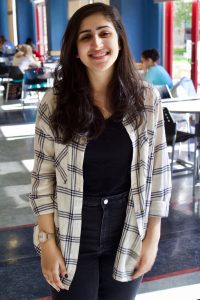
Dania Ali
“I was born and raised in Qatar, which is a small country next to Dubai. I’m actually Pakistani, I was born and raised there.
From me, I kind of saw this idea of politics when through the oppression within the country. As an aspiring journalist, freedom of press is a huge thing but a lot of my ideas within school would be suppressed. For example, we’d be writing articles on terrorism or the crisis in Syria but we couldn’t mention ISIS or we could not mention the actual crisis going on. This is just within school – the basic press level. So I think that’s when I started seeing “inquire” a lot, the heavy censorship.
Besides that, I’m Pakistani and in Pakistan there’s a lot of political corruption I think the main root of most of the problems that exist within society is because of the political corruption that exists. The way it affects my family there, is that a lot of people have given up hope in the system itself. They sort of accepted it and I think that’s one of the scariest things for me, it’s seeing that acceptance and not seeing people wanting to stand up anymore or wanting to try to at least change something. So I think that’s where politics affects me in a way, in those two dynamics.”
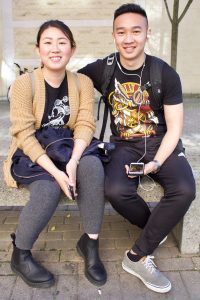
Ervine Mac and Salena Chen
E: “My name is Ervine Mac and I’m currently a fourth-year in Business Technology Management.”
S: “My name is Salena Chen and I’m a third-year Nursing student.”
E: “For myself, I don’t really have a political identity, but I just feel that people should be involved in politics. I am getting started to get more involved. Not that I support either Liberal or any conservative party. It’s just because I believe everyone should have equal rights. I feel like the environment right now is leaning more towards a business focus, so the liberals and conservatives have more of a business focus. I just believe we should give other parties a try like the NDP or other parties because they focus more on lower-income families. I believe right now, the target is mostly for business to excel but not really for the environment.”
S: “I don’t feel like I have a political stance and I have never really been interested in politics. But I recently have been taking a homelessness class and I have been learning a lot about what’s actually going on in the homelessness crisis. That really got me thinking that I should be involved in politics and be more aware of what’s really going on. Knowledge about what’s going on in terms of government and policies is power.”

Bella Leigh
“I’ve gone through a lot of political ideologies through my years. I’ve found myself going back and forth across the grid but never going too extreme one way or the other.
At the moment I’m definitely left wing, however I am very upset with the government because the liberals had promised a lot of different things and are quite obviously not following through. I believe that Justin Trudeau brought about hope for a change to Canada after Stephen Harper had ruined multiple things, but he hasn’t really made any progress on items such as the environment and it has made me very upset.
I was a part of the environmental council in my high school and we really tried to make people more aware of the damage that we are causing. I’m frustrated that people don’t understand that we are running out of resources and space.
To give an idea of why I am annoyed with Justin Trudeau’s Liberal party is that he decided to go ahead and let the pipeline go through aboriginal land because it benefited the economy, but it is going to be a long term problem with many difficulties ahead for the environment.”
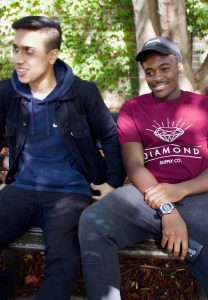
Saad Afzal and Gedeon Kashama
S: “The reason I’m not really into Canadian politics is because even though it affects me, at the end of the day it doesn’t really bother me because either way I’m going to live my day how I want and just do what I want. I don’t really think they’re going to put any restrictions on what I’m doing so what do I care.”
G: “I really have no political identity at all. I don’t really know much and I don’t really care to know much. Honestly, as long as a dictatorship isn’t being started I’ll just be chillin’ and not thinking about politics. In other words until World War III starts, I’m Gucci.”
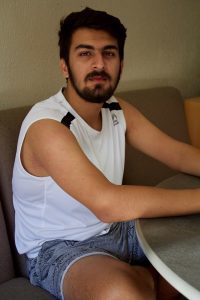
Abhi Raheja
“My name is Abhi Raheja and I am from India. I’m from northern India, like the very center of the South Asian politics. I mean the politics of Pakistan, China, Sri Lanka – it all revolves around the politics of New Delhi because India by far is the most influential country in that region, like economically, politically and other reasons.
So my family has no political background and my entire family is super nerdy, my dad is a professor – PhD and shit. So my dad’s a businessman with no political background whatsoever but in grade nine I got involved model UN conferences because I started training kids in public speaking and debating which lead me to go to a lot of moot court, like law debates which take place in Law colleges. I was like that high school kid going to college debates and doing well, you know, so I got to know people.
At one of these debates, I emulated one of the top political leaders and the chief guest was so impressed she invited me over and the chief guest was the Chief Minister of Delhi – that’s like being the Premier of a province in Canada. She was very influential as in the Prime Minister of India as well. So she invited me over for lunch. So we had a talk and then she offered me to do an internship, so that kind of got me involved into the political office.”
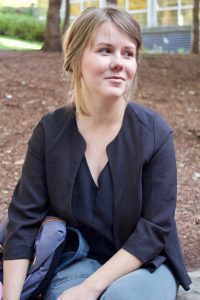
Ashley Paulson
“I’m 27 years old and when I was younger I thought I was Liberal because it made a lot of sense in terms of supporting human rights, but the older I got the more Conservative I became.
I find it hard to go to Ryerson because, for example, I found that every teacher would speak on matters like Trump and say you have to be a Liberal or you’re a bad person.
However, what if there are people in class who agree with some of his policies, you’ve now created an unsafe place for these individuals. There is such a feud between the two political ideologies that no one is able to just listen and properly evaluate the other person’s beliefs.”


Leave a Reply